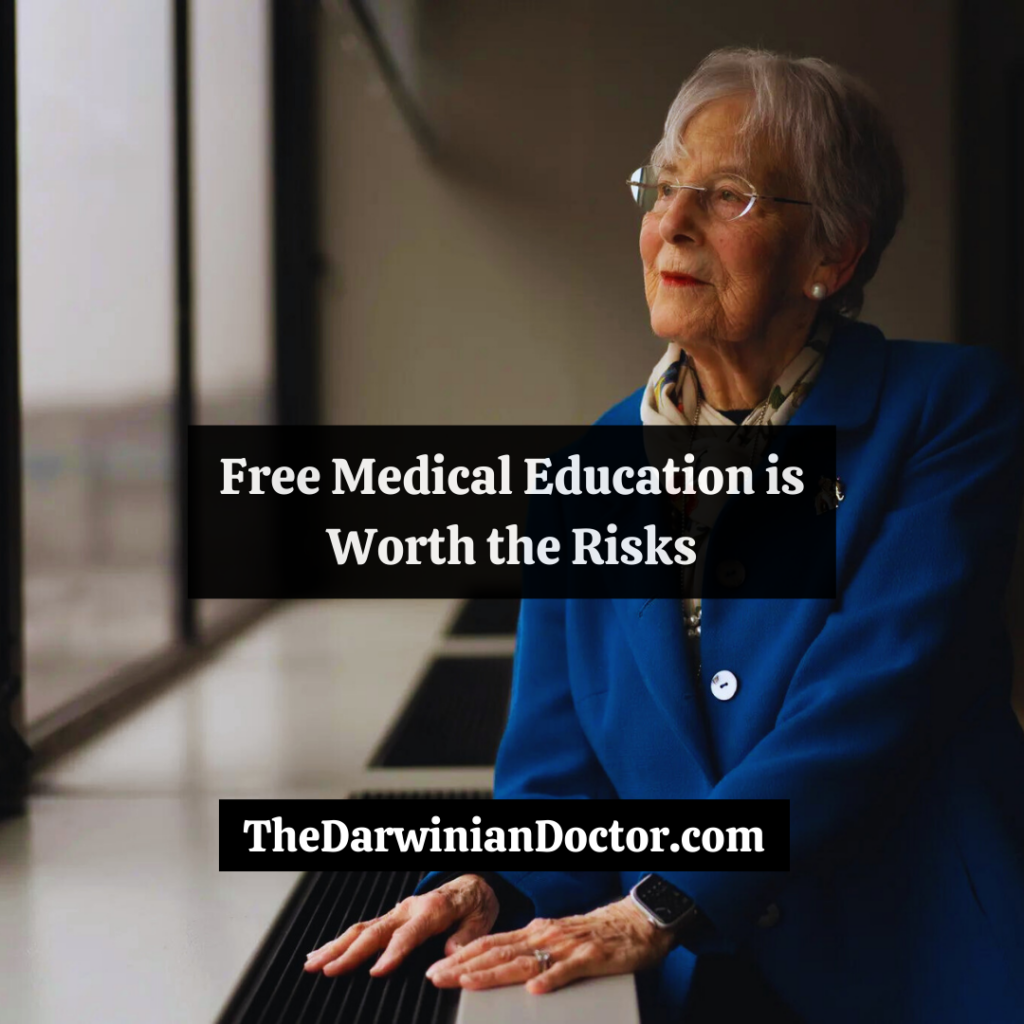After the $1 billion gift to Albert Einstein College of Medicine, do we think that the risks of free medical education are worth the benefits?

I was perusing my news feed last week when I stumbled upon this news story that a $1 billion gift from Ruth Gottesman has made Albert Einstein School of Medicine tuition free.
I also noted some live footage on TikTok from the actual announcement:
I felt a heady mix of emotions as I watched the Albert Einstein medical students jumping for joy and hugging each other. First and foremost of my emotions was elation for the students. I pictured myself in their shoes, knowing that all of a sudden, hundreds of thousands of dollars of student debt had been wiped away from their immediate futures. I would have been right there with them, jumping up and down like a madman.
As I settled down from the shock of the announcement, I thought about the magnitude of the gift that was required to make Albert Einstein tuition free.
One billion dollars
Here is one way to visualize this amount of money to put it into perspective: $1 billion dollars of stacked one dollar bills is 124 times taller than Burj Khalifa, the tallest building on the planet.


Or put another way that is more relevant: If you collected $1 million per year of income and had no living costs, it would still take you one thousand years to save your way to $1 billion. Of course, you’ll get there faster with investing the money, but you get the point, right?
It’s a lot of money. If you really consider that number, it’s almost an unimaginable sum of money.
After pondering this for a few minutes, I was overcome with another question: Why does it take a billion dollars to make a med school tuition free?
The answer is that a medical school education is very expensive!
Medical school is expensive
The average annual cost of medical school goes up every year and currently sits at around $58k per year of medical school.
Because of this enormous cost, there are only a few medical schools in the United States that are tuition free. A few others are tuition free depending on financial need. The vast majority expect the students to take on the majority of the tuition and living costs themselves. That’s why most students graduate medical school with about $200,000 of student debt from medical school (and $250k total student debt).
This mirrors my situation, in which I funded my medical school education 100% with student loans. I graduated from medical school with $200k in student debt, which ballooned to $300k by the end of my six years of residency training.
Free medical education can lower diversity
As I reviewed the media coverage surrounding the massive donation, I saw that it was almost entirely positive coverage. There was however some coverage that I found very interesting that linked tuition free medical education to lower diversity.
This article at Statnews was written by a medical student and resident physician. It highlights some interesting facts about what happened at NYU Medical School after it became tuition free:
- Applications rose 47% overall
- Applications from underrepresented groups rose 102%
- Average MCAT scores and GPA in matriculated students rose
- African American/Black students dropped from 14% to 11% of the incoming class
- No students from the 2018 inaugural tuition free class went into family medicine
The writers pointed out that with only a few tuition free options for medical education in the US, admission to these schools is incredibly competitive. The most competitive medical students often gravitate to the more competitive specialties as well.
Furthermore, increased competition to enter a medical school heightens the disadvantage of underrepresented minorities, who typically face greater challenges than their white counterparts along the way to a medical degree.
Reduced diversity should always be looked at with a critical eye, but especially in the medical field. Research has found that patient-physician racial concordance can have important positive impacts on access to care, patient perceptions of the care they receive, and their health outcomes.
So is tuition free medical education bad?
Despite these findings, I do not believe that tuition free medical education is bad for our medical community. In contrast, I think we should focus our angst at the scarcity of tuition free options.
If all medical schools were tuition free, for example, there wouldn’t be a crush of applications for the few schools that heavily subsidize medical education. Therefore, underrepresented minorities would have improved chances of admission as well as access to lower cost medical education. This would improve diversity in our physician population.
Furthermore, though the data so far hasn’t supported this, it stands to reason that a lack of student debt may increase consideration of lower paid but essential primary care specialties.
On a personal note, I know that if I hadn’t been staring at $200k of student debt, I would have more carefully considered psychiatry. This was a specialty that I really enjoyed in medical school. With my family so heavily scarred by the loss of my sister in her early college career, this was a specialty that also appealed to me for very personal reasons.
Instead, I chose urologic surgery for many reasons. While I love surgery and the multitude of ways in which I can help patients as a urologist, the higher income from the specialty also played a role in my decision.
I knew that I faced an uphill battle when it came to stabilizing my family’s finances, and that the income of a urologic surgeon would really help with that journey. Though we spent a lot of money in the first few years of my attending career, that high surgeon income set my family on a strong financial foundation and trajectory.
Good deeds can be contagious
By pointing out the risks of tuition free education in terms of diversity, I don’t want to diminish the incredible gift that the Albert Einstein students received from Ruth Gottesman. Free medical school will be life-changing for those students and the future doctors to come from Albert Einstein. It took incredible bravery and conviction to donate so much of her foundation’s philanthropic power to one institution.
I’ve had the gift of a spouse who works in the nonprofit world, and therefore I have a special lens into the world of philanthropy. What I’ve observed is that good deeds of philanthropy can be contagious.
It only takes one amazing deed of philanthropy to potentially spark many more.
Time to invest in our future doctors!
So if any other wealthy philanthropists are reading this, my message here is simple: tuition free medical school is a good thing and worthy of your donations.
And to formally answer the question: Yes, free medical education is worth the risks.
Because let’s be honest: there are troublesome trends in American healthcare. From the doctor shortage to the private equity takeover of our emergency rooms and hospitals; we should all be concerned about what we are seeing. If you want to have a robust healthcare system to take care of you, it could use some help now. Consider it an investment in your own health!
If more schools go tuition free, it will have a ripple effect that can help grow our ranks of doctors. The reduced loan burden will also empower physicians to push against these worrisome trends.
I truly believe that financial empowerment is one of the keys to mobilizing our physicians to push healthcare in the right direction. That’s why I push so hard to steer physicians and professionals towards financial freedom. It’s key to unleashing their true potential.
There is nothing like debt that is better at enslaving workers. Debt is insidious and it absolutely affects behavior. As my former department chief always said, “I love it when my doctors buy a big house. I know they’ll always be there if I need some extra coverage.”
There’s nothing wrong with having doctors available when you need them. But I do have an issue with coverage coming at the risk of burnout and decreased satisfaction for our physicians.
Conclusion
Free medical education has risks, primarily in the areas of reduced diversity. Despite this, there are many more benefits to be had from a free medical education for both physicians and our country.
Congratulations to Ruth Gottesman and the medical students at Albert Einstein College of Medicine. A tuition-free education is a thing of beauty. It will cause many ripple effects at Albert Einstein. Some will be unintended and negative, but the vast majority will be positive.
The increased financial empowerment and autonomy this gift will buy for those future doctors is priceless. It is one step towards a better physician workforce and a more robust American healthcare system.
Let’s hope others in a similar position will step up and replicate her gift.
– The Darwinian Doctor
What do you think about the donation? Let us know in the comments below!
Make sure to subscribe to the email list so you never miss a post!
Experience the financial benefits of real estate without dealing with the headache!
Want to support the blog?
- Join our investor club at Cereus Real Estate
- Visit my Recommendations page
- Check out my wife’s food blog: Eat Dessert First
- Stay at our luxury short term rentals
- Check out my TikTok channel
- Follow me on Instagram
- Follow me on YouTube
- Contact me with questions


